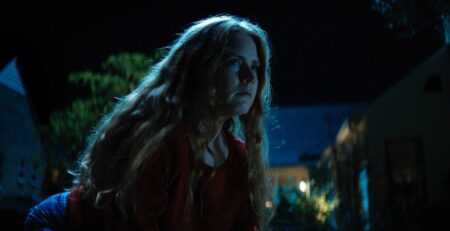
The Starling is a comedy-drama Netflix Original about a couple a year out from unimaginable loss. It is directed by Theodore Melfi, written by Matt Harris, and stars Melissa McCarthy, Chris O’Dowd, and Kevin Kline.
Everybody should be in therapy. But of course, with our abysmal healthcare system that makes it cost too much, the heaps of stigma around it, and the fact that not every therapist is good for you, or even good at all, makes it all the more difficult to have access to mental health care. The Starling is the kind of film that is obviously designed to be an emotional roller coaster from the very first moment. Its entire premise is tragedy over and over, and watching people suffer but ultimately find peace is a surefire formula for a perfectly fine movie. And The Starling is that perfectly fine movie. Its actors are impactful, its metaphor is heavy-handed but still the right kind of sappy, and its CGI only felt uncanny briefly.
I’ve seen people go through the kind of anguish that O’Dowd and McCarthy’s characters, Jack and Lilly, each do and have the fortune to receive care, support, love, and patience and all the things the movie touchingly depicts. But as I watched The Starling I found it so difficult to suspend my disbelief. My disbelief over how Lilly just kept getting more and more chances at work without being fired for doing clearly fireable things. My disbelief that her likely minimum wage job even kept her afloat for a whole year in such a nice house and likely some steep medical bills. My disbelief that she essentially got free, decent quality therapy from a stranger. And my disbelief that Jack was so easily able to get decent quality care himself. It’s all nice in a tragic little movie. I wish so badly that this was what it looked like when you sought mental health support, not just in the wake of a tragedy. But what this film depicts is so far from even the most average of circumstances seeking mental health care, let alone folks with less privilege than the Maynards.
It didn’t hit me so hard during the movie itself. There were a few moments that were hard to believe. Still, the likes of Daveed Diggs (Hamilton), Timothy Olyphant (The Mandalorian), and Skyler Gisondo (Night at the Museum, Booksmart) rounding out the supporting cast and a fairly well-done plot had me perfectly satisfied throughout. The titular starling is a CGI creation that, while distracting in the early sequences, eventually just becomes a beloved part of the cast. And full kudos to the set designer because each set deeply reflects the kind of people that inhabit them and had me jealous of their furniture.
But when it was over, mixed with the emotions of the film’s ending itself were my own emotions about how absolutely unrealistic the story was for the vast majority of people. Entertainment is escapism, certainly. But it’s hard to escape when my own experience and that of those around me, especially working for a social service agency, are so far from this whitewashed and clearcut portrait of tragedy and depression. It doesn’t mean the movie was terrible. It just means I wish it didn’t make it feel like mental health care should be so simple and rapidly successful.
To come to the film’s defense on one front, however, Larry, the therapist-turned-vet from who Lilly receives support, has a very powerful scene with Jack later in the film where Jack accuses Larry, rightfully, of being in the middle of their business for selfish reasons. I can see people having an issue with Larry’s character and how he inserts himself too heavily or makes the not-therapy therapy he offers Lilly about himself. But I would argue that he’s one of the better depictions of a therapist I’ve seen on-screen.
Psychology is an inherently selfish field to go into. You don’t choose to go through years of school and copious amounts of costs to subject yourself to dealing with people’s darkest moments if you’re not feeling personally gratified by it or trying to answer some bigger questions. So even in his selfishness, Larry’s type of care is exactly what Lilly needs. She possibly wouldn’t succeed with other therapists who use different methods or have different personalities. So while my qualms remain with the simplicity of accessing his care, I appreciate that he’s a full human who says the wrong thing occasionally or that he isn’t always helpful, especially in his most selfish moments.
The Starling is perfectly fine. The cast is pretty good, and the story is effective. It’s just a bit hard to appreciate in its totality when it makes something so hard to have for yourself seem so simple. Its cut and dry movement through tragedy can have its catharsis effects, but it can also produce some feelings of despair just the same.
The Starling is streaming now on Netflix.
The Starling
-
Rating - 6.5/106.5/10
TL;DR
The Starling is perfectly fine. The cast is pretty good and the story is effective. It’s just a bit hard to appreciate in its totality when it makes something so hard to have for yourself seem so simple. Its cut and dry movement through tragedy can have its catharsis effects, but it can also produce some feelings of despair just the same.




